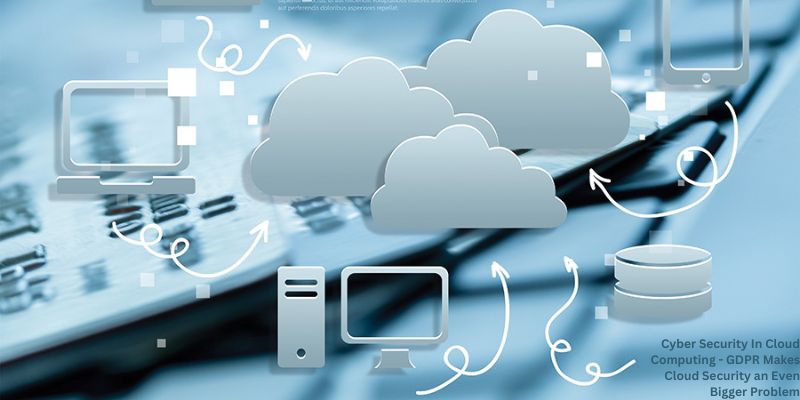The way that organizations manage, access, and keep their data has completely changed thanks to cloud computing. With its numerous benefits, it has become an integral part of many organizations’ infrastructure. However, as technology continues to advance, so do the threats that come with it. In this technology blog post, newtimezz.com will explore 5 best things that you should know about cyber security in cloud computing . Stay tuned as we uncover the key aspects of this ever-evolving landscape and shed light on the importance of robust security measures in the cloud.
Contents
- 1. Cyber Security In Cloud Computing – Security of Data and Transactions Is Ultimately the Organization’s Responsibility
- 2. Cyber Security In Cloud Computing – The Goal of Cloud Vendors Is to Improve Security and Facilitate Business Use
- 3. Cyber Security In Cloud Computing – The Use of Cloud Computing May Boost Security
- 4. Cyber Security In Cloud Computing – GDPR Makes Cloud Security an Even Bigger Problem
- 5. Cyber Security In Cloud Computing – Internet of Things (IoT) Has Already Had an Impact on Cloud Security
- Conclusion
1. Cyber Security In Cloud Computing – Security of Data and Transactions Is Ultimately the Organization’s Responsibility

Cloud providers are aware that they must do their role in cyber security, but in the end, if a customer’s data is hacked, it is the business that will be held accountable or fined. Similar to this, if a business is the target of a ransomware attack, the business is responsible for paying the hacker. This implies that you shouldn’t let your guard down just because you’re employing cloud computing.
One source claims that two major reasons for data breaches in the cloud are incorrectly configured access controls on storage resources and neglected or inadequately secured systems, both of which fall under the purview of the company and not the cloud provider. Nevertheless, you must keep placing a high premium on cybersecurity and ensure that your staff is well-versed in current risks and predictions.
If you are interested in similar topics, you can also refer to Cloud Computing Vs Cyber Security
2. Cyber Security In Cloud Computing – The Goal of Cloud Vendors Is to Improve Security and Facilitate Business Use
The security of cloud service providers’ own products has already received substantial investment. You can be certain that security has been given top attention when the major participants are Microsoft Azure, Google Cloud Platform, and Amazon Web Services—if for no other reason than self-interest—and some of the sharpest minds have been assigned the job. They are focusing on helping their consumers feel more secure right now.
As an instance, Google provides a Cloud Security Command Center that serves as a scanner to check for vulnerabilities, while both Amazon and Microsoft have developed programs and infrastructures to assist, as noted in an article at Forbes. Ask your vendor for advice if you’re unsure of how well you’re protecting access and data on your end.

3. Cyber Security In Cloud Computing – The Use of Cloud Computing May Boost Security
Cloud computing can occasionally provide a security fix. Because they lack the resources or haven’t invested them in enhancing their cybersecurity, small and medium-sized enterprises are particularly susceptible to assaults like ransomware. As mentioned above, cloud companies offer some of the most effective security measures in the IT industry, thus switching to the cloud might increase their overall security. Although it can be difficult for some IT managers to accept, given their natural propensity to retain data where they have the greatest apparent control over it, some believe that shifting data to the cloud is more safe than keeping it on-site.
4. Cyber Security In Cloud Computing – GDPR Makes Cloud Security an Even Bigger Problem
The General Data Protection Regulation (GDPR), which came into effect in May 2018, is now in force. As a result of the fact that inhabitants of the European Union (EU) and European Economic Area (EEA) frequently do business with companies outside of these regions, even though it only applies to residents of these regions, it has broad implications for businesses worldwide. These firms and entities will need to ensure that their data practices are compliant with GDPR.
Although legal guidance is the best approach to assure compliance, both the cloud vendor and the cloud customer must adhere to data protection procedures in general. Each solution for companies using a multi-cloud solution from more than one provider must also comply. You should make an effort to keep on top of this because it may get a bit tough.

5. Cyber Security In Cloud Computing – Internet of Things (IoT) Has Already Had an Impact on Cloud Security
Despite all of the advancements achieved in data centers, cloud solutions, and network infrastructure security, the Internet of Things (IoT) is poised to erase much of that progress. Because IoT devices frequently don’t have the level of security they should (yet), there is a corresponding rise in security flaws. As a result, they undermine existing cyber-security initiatives by providing a “way in” to your data and even cloud solutions. According to one expert, when firms cope with these isolated security breaches over the next couple of years, it will be so severe that it will resemble a game of Whack-a-Mole.
Conclusion
In conclusion, understanding the key aspects of cyber security in cloud computing is crucial for organizations and individuals alike. It is important to recognize that while cloud vendors strive to enhance security measures and support business operations, the ultimate responsibility for data and transaction security lies with the organization.
Additionally, embracing cloud computing can actually strengthen security efforts through the utilization of advanced security features provided by cloud vendors. However, it is essential to address the potential challenges posed by regulations such as GDPR, which highlight the need for robust cloud security practices.





